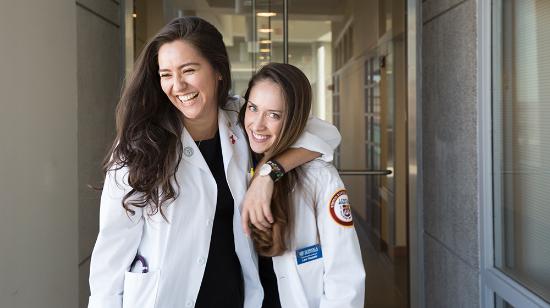Latino Medical Student Association wants to unify in the face of uncertain times

Elizabeth Castellanos and Lexi Riopelle organized the Latino Medical Student Association (LMSA) Midwest Regional Conference, held at Stritch.
By Erinn Connor
When Elizabeth Castellanos and Lexi Riopelle attended last year’s Latino Medical Student Association (LMSA) Midwest Regional Conference, they felt like a whole new world of opportunities was open to them, even as first-year medical students at the Stritch School of Medicine.
This year they’ve taken the reins of organizing the conference and are hosting it at Stritch on February 3, and hope to give all attendees the same empowering experience. The women agree that Stritch’s mission of social justice and reaching out to underserved communities dovetails with the LMSA mission.
“Stritch really stands for diversity and equality,” says Castellanos. “And this conference is a way to empower fellow Latinx medical students, or those who may be interested in some kind of career in medicine. Both share a lot of the same values.”
The theme of the conference is “El querer es poder,” or “If there is a will, then there is a way.” Riopelle says one important message they’re hoping to convey is the importance of staying united in these uncertain and tumultuous times, in politics, in culture, in society.
“A lot of the students are dealing with the same things, the same stresses,” she says. “We’re trying to unite all of us and talk about what we can do going forward.”
Keynote speakers at the conference include Jonathan Cohn, a senior national correspondent at The Huffington Post, who writes about politics and policy with a focus on social welfare, Virginia Bishop, MD, MPH, an assistant professor of preventive medicine at the Feinberg School of Medicine at Northwestern University, and Stritch alum Jonathan Moreira (MD ’09), an assistant professor of medicine (hematology and oncology), also at Northwestern.
Workshop topics include caring for undocumented patients, roadmap to becoming a Latinx physician, alternative medicine, addressing health disparities, a residency panel, and more. Students will also have the chance to network with members of the National Hispanic Medical Association and the Medical Organization for Latino Advancement.
Both Castellanos and Riopelle’s journeys to medicine and to Stritch started in California, their home state. Elizabeth grew up in Los Angeles and Lexi in San Francisco, and they swapped cities for their undergraduate education. But their motivations for becoming physicians differ.
Riopelle grew up in a family with deep roots in medicine. Her dad is a doctor; her mom a nurse practitioner. Many of her uncles are physicians. She volunteered at clinics throughout her undergraduate career. Going to medical school almost seemed like a foregone conclusion after being surrounded by health care her whole life.
“I love the community environment, and how genuine everyone is and how willing people at Stritch were to help us with LMSA activities,” says Riopelle.
Castellanos didn’t know any doctors growing up. Her parents are immigrants from Mexico, she grew up with in-home remedies, with no health insurance, and translating for her parents at doctors’ offices. The expectation for her was to become a stay-at-home wife, but that wasn’t what she wanted for herself. She wanted to make it easier for people like her parents to get medical care, to break down that cultural barrier between immigrants and physicians.
“I feel like I stand for everything Loyola stands for,” Castellanos says. “I see myself working in undeserved, minority populations as a physician. It’s similar to what I grew up in, it’s what I know.”
At Stritch, they see their work with LMSA just as important as their time spent in lecture halls and labs. They know the importance of having mentors to help them achieve their eventual career goals, and how meaningful it can be to see someone with the same color skin in leadership roles.
They invited high school and undergraduate students to attend the conference in hopes that some of them may now see a future in health care not only as a possibility, but also an attainable goal.
“That’s a crucial age range in determining what your life is going to look like,” says Castellanos. “For us, we’ve made it here, it’s going to happen. Giving these students the opportunity to see people the same color as them, with similar backgrounds, it’s something really big. I think it’s something that both LMSA and Stritch stand for.”
